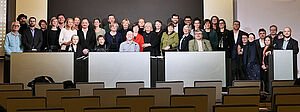Mediadelcom project presents recommendations for the media sector in Brussels
For three years, a consortium from 14 countries, with the involvement of the Erich Brost Institute, researched the risks and opportunities for successful public communication.
Many media professionals and researchers agree on deliberative communication as the ideal for public debates: solutions should be found through the equal exchange of all parties involved, based solely on the best argument, rather than on power structures or 'deals.' But what does the public sphere need to achieve this goal, which actors play a key role, and how can the conditions for public deliberation be improved? These questions were explored by the Mediadelcom project, funded by the EU's Horizon 2020 program, with the Erich Brost Institute as the German partner, led by Marcus Kreutler and Prof. Dr. Susanne Fengler. The final conference took place in Brussels on February 15.
The three-year project was mainly divided into the development of the theoretical framework, the creation of country case studies on monitoring capacities in the media sector and key developments since 2000, and finally the analysis of the collected material. As a result, the researchers identified combinations of conditions under which deliberative communication works better—or worse. They then created scenarios for future developments and media policy recommendations.
Given the breadth of the research and the variety of its target audiences, the challenge was to create a conference for everyone: EU and member state media policy, research, media, and ultimately the entire interested public. Zrinjka Peruško from the Centre for Media and Communication Research at the University of Zagreb delivered a research-oriented keynote, presenting key findings of the Mediadelcom project. One example: according to the data, public deliberation works better in countries where people still have relatively high trust in journalistic mass media—whereas high trust in social media is associated with less societal deliberation in the countries studied.
The second keynote addressed the dangers to free media reporting from a different perspective. Economic sustainability, said Marius Dragomir, Director of the Media and Journalism Research Center in Budapest, is a fundamental prerequisite for efficient and free reporting media. This set the stage for panel discussions and round tables: The two keynote speakers, along with Eric Heinze from Queen Mary University in London and Ioana Avădani, the Romanian Mediadelcom representative, discussed East-West differences in the media sector. Michał Głowacki and Marcus Kreutler from the Mediadelcom project spoke with Renate Schroeder from the European Federation of Journalists and Laura Becana Ball from the Global Forum for Media Development about the interaction of different actors for successful public communication and the planned European Media Freedom Act. Finally, Daniel Hallin from the Mediadelcom advisory board invited all participants to exchange different perspectives.
Can an academic project event simultaneously address such diverse audiences as communication research, media policy, and media practice? The responses from the audience suggest that it can: journalists, NGO representatives, and media regulatory authority representatives all contributed to the discussion. Journalism education was represented from both the perspective of educators and students, who clearly expressed their expectations and desires for future-oriented training in moderating public debates.
The exchange with students was also facilitated by excursions from the Slovak and German project partners. Nine students from the Institute of Journalism (IJ) participated in the event, bringing valuable insights to the discussion. Their trip was rounded off with visits to EU institutions the day before.
An insight into the methodology and country case studies is also provided by a series of publications from the European Journalism Observatory.
More information about the MEDIAdelcom-Projekt can be found here.

